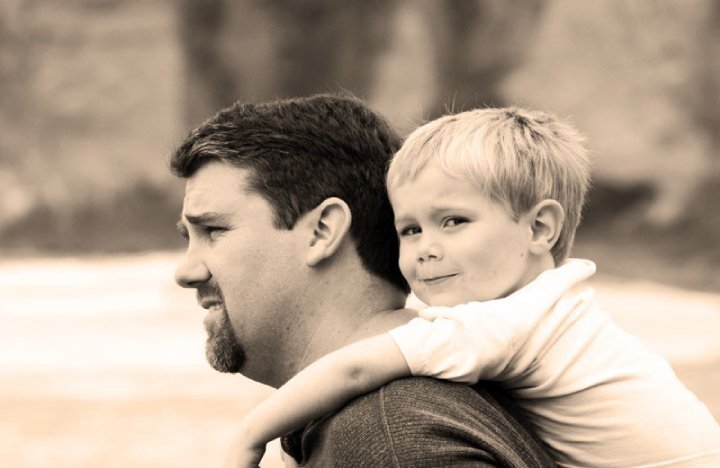Parenting and the Problem of Proverbs
 Sara and I are fortunate to have a community that seems to “get” the autism thing. That is to say, most people don’t assume we are bad parents when Jack goes limp on the sidewalk, or screeches for Puffins at Safeway. It probably helps that his words are so slurred and his stims so obvious. They can tell something is different. Not all parents are so lucky. Some get the “you-suck-as-a-parent” stink eye, even from family members.
Sara and I are fortunate to have a community that seems to “get” the autism thing. That is to say, most people don’t assume we are bad parents when Jack goes limp on the sidewalk, or screeches for Puffins at Safeway. It probably helps that his words are so slurred and his stims so obvious. They can tell something is different. Not all parents are so lucky. Some get the “you-suck-as-a-parent” stink eye, even from family members.
Case in point: I recently read this heartbreaking post from a mom whose daughter has autism, but whose family isn’t buying it. They blame the girl’s non-verbal, non-social behavior on a lack of parental discipline. And they quote scripture to support their case. Doesn’t the book of Proverbs says things like, “Spare the rod and spoil the child?” If we only “train up a child in the way he should go, he will not depart from it.” I’m not going to address the obvious haughty, holier-than-thou attitude. That’s too easy. Instead, I want to challenge the assumptions these folks have about child-rearing and the book of Proverbs.
There are entire parenting books, curriculums and philosophies based on the idea that if parents will simply follow the biblical formula, their children will do what’s right, because Proverbs guarantees it.
Except, they often don’t, and it doesn’t. There is no formula.
Proverbs is not a book of air-tight systems, but a book of wisdom. That’s why it’s called “Proverbs” and not “Promises.” Don’t get me wrong, it’s really good wisdom from a man who was, at the time, walking in a God-inspired perspective, giving us thirty-one chapters of trustworthy sayings and ideas. Pure gold. Take this one:
“My son, forget not my law, but let thy heart keep my commandments, for length of days and long life, and peace shall they add to thee.”
Why does the law of God give us long life and peace? Because it keeps us from being stupid, that’s why. It keeps us from drug deals, bank heists, and violence outside of strip clubs at 2 a.m. It teaches us to love our neighbor and not to steal his Wife or his Wii. Those activities lower life expectancy, see, as do sexual promiscuity, excessive drinking, and burglarizing Texans at night.
But does that Proverb promise that we will live long, tranquil lives? If so, then we’ve got a problem, because people die young every day. Godly people. People who have remembered God’s law. People who have done everything right: loved God, loved their neighbor, loved the least of these. For them, the Proverbial Force Field didn’t work.
Please hear me: I’m not being snarky. Proverbs is an inspired book that God and the church wanted us to read as a part of the canon of scripture. But if read them as iron clad promises–in this case, parenting methods–that will immunize our children from problems so as to ensure proper childhood development and perpetual love for God and man, we will be deeply disappointed. Because that system doesn’t exist. I wish it did. But even God, the perfect Father, has a few kids who have gone astray!
Is discipline essential to parenting? Absolutely. But it’s not going to look the same with every kid. Our five children are unique individuals, and they respond in different ways. Yours will, too. Not just the ones with special needs. That’s exactly what I take from the “train up a child” verse. It’s not talking about one specific methodology, but of “his way” or “her way.” We need to get to know our kids, and then help them on their unique journey.
My Jackson, then, is not a science to be studied, but a person to be known. And he has a will that will never, ever, go away. I admit, that makes me nervous. But it sure beats the alternative.
There is much to glean from the Proverbs, and yes, even from parenting books, but they cannot take the place of good, old-fashioned love and prayer. Parenting is hard, whether your child is autistic or NT (neuro-typical). We don’t need owner’s manuals. We need patience, wisdom and understanding, both for our children, and for other struggling parents. Because Solomon’s sayings were never intended to be weapons against those whose problems happen to be more mysterious than our own.





Fantastic! Thank you so much. I have laughed and cried during this short read. Our own son Jackson, is 20. He is incredible, funny, sneaky, beautiful and he overcomes the challenges of autism every day. What conversations we could have! Keep writing. Bless you and your journey.